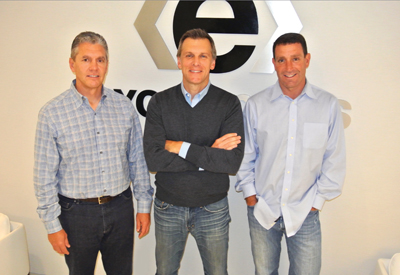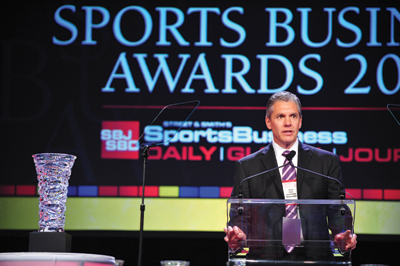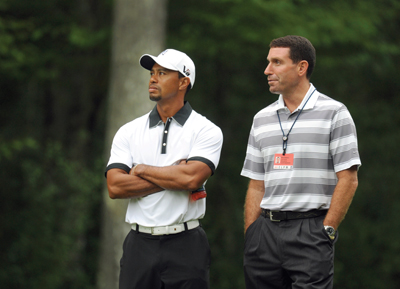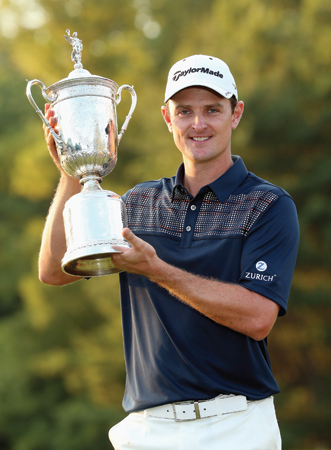It was 22 years ago this summer when three ambitious young men met as they embarked on a career in sports business.
Mark Steinberg, Jeff Schwartz and Casey Close began working at the Cleveland headquarters of IMG. In 1992, that was the place to work if you wanted to be an agent. IMG’s founder, Mark McCormack, was active in running the company, and young executives relished the chance to learn from him.
 |
Excel Sports Management’s (from left) Casey Close, Jeff Schwartz and Mark Steinberg
Photo: COURTESY OF EXCEL SPORTS MANAGEMENT
|
“It was an incredible training ground,” recalled Schwartz, who now, more than two decades later, is founder and president of Excel Sports Management. “One of the things that Casey, Mark and I talked about early on was all of us learning from IMG. It gave us a sense of how to do business at the highest level. All of us have a similar philosophy, but we may come at it from different ways.”
The three used those experiences and learnings as they advanced in their careers, and those same experiences served as the foundation for when they joined as partners in Excel in 2011. Each had a different area of focus: Schwartz had a strong background in basketball, Steinberg is best known as the agent to Tiger Woods, and Close started his career representing Derek Jeter and now runs one of the most successful baseball practices in sports. But the merger of the three friends created a multisport agency with superstar talent and widespread influence.
In the three years since forming their partnership, they have grown that practice while also turning down numerous offers from agents who wanted to join their business, as well as from people who want to acquire their firm or be represented by them. Most of the time, the shared philosophy has been to stay the course.
“We receive opportunities all the time that we get to look at and make a decision on, and 90 percent of the time we say, ‘No,’” Schwartz said. “We are very specific on what we say ‘Yes’ to.”
In the last year, the partners have given the nod to three major decisions that could transform the agency.
First, last November, the company quietly launched Excel Consulting, bringing aboard industry veteran Joe Zajac to lead it (see related story). Then, in January, the company altered its strategic positioning by promoting senior vice president of marketing Jaymee Messler, who was at Excel when it was founded, to chief marketing officer. Messler, who has worked with Schwartz for 17 years, has been behind a number of creative endorsements, including client Blake Griffin’s multiyear deal with Kia after his car-jumping performance at the 2011 NBA All-Star Weekend.
 |
Among the firm’s recent major moves: Promoting Jaymee Messler, who was behind Blake Griffin’s Kia deal, to chief marketing officer.
Photo by: TEDDY TELLES PHOTOGRAPHY
|
“Promoting her to CMO made enormous sense as she was already setting our marketing strategy for the clients as well as our company,” Schwartz said.
But the biggest move was still to come. In April, Excel brought in former IMG marketing agent Alan Zucker as the firm’s fourth full partner. Zucker, whose contract at IMG was up, is a longtime friend of Schwartz, Close and Steinberg, and he was brought on to head Excel’s talent marketing and endorsement sales for clients. He brought with him a high-profile client list that includes NFL quarterbacks Peyton and Eli Manning, NASCAR driver Danica Patrick, and country
 |
Photo by: NBAE / GETTY IMAGES
|
music star Taylor Swift (
see related story). In his new role, Zucker will continue to negotiate and secure endorsement deals and corporate partnerships for the clients he brought with him from IMG, but he will work on deals for Excel’s growing list of talent, as well.
Schwartz said Excel had been looking to hire someone like Zucker for some time.
“We thought, ‘Let’s bring in somebody who is a heavyweight in sales itself,’” Schwartz said. “And we thought about different people, but always with an eye on Alan. ‘If Alan would do this, Alan would be the perfect person for us.’ It was like, ‘We need someone like Alan Zucker. Why can’t we get Alan Zucker?’”
The three founding partners said it was much more difficult to find the right person to launch the company’s corporate consulting business. In fact, Schwartz, Close and Steinberg interviewed about 30 people before asking Zajac, who was formerly a group vice president at Team Epic, to join the agency as senior vice president and lead the consulting group.
All three said it came down to fit, where the partners didn’t feel certain candidates would be right for the culture they had established at Excel.
“We wanted to try to get just as perfect a fit as we could,” Steinberg said. “It took us a while to come across Joe, and then everything just clicked.
“Fit is everything. Fit and culture.”
CULTURE AND HISTORY
In the last decade, large agencies representing multiple athletes across sports have dominated the athlete talent business in America. CAA Sports, Wasserman Media Group, Relativity Sports, Octagon, and Lagardère Unlimited are among those that have signed the best athletes across the top team sports, as well as stars in tennis, golf, action sports and the Olympics.
What’s different about Excel is that it is owned and run by three (now four) executives who are among the most powerful agents across different sports.
When Schwartz founded Excel in 2002, the company was solely representing NBA players, among them Jason Kidd, Lamar Odom, Paul Pierce, Jerry Stackhouse and Tyson Chandler. By 2011, Schwartz, who had started his career as a tennis agent at IMG, was regarded as one of the more influential agents in basketball circles.
 |
Above: Casey Close accepts Excel’s Sports Business Award for Best in Talent Representation and Management in May. Below: Will Beatson, Jim Murray, Stirling Fiss, Close, Jaymee Messler, Alan Zucker, Hal Biagas and Andrew Kipper.
Photos by: ROXXE IRELAND, MARC BRYAN-BROWN
|
But he saw a chance to grow. In April 2011, Close’s contract was up at CAA Sports, and he joined Excel as Schwartz’s first partner. Three months later, Steinberg joined when his contract was up at IMG.
With the reunion, the three friends embarked on a new business venture together.
“There has always been a plan,” Schwartz said of the vision to grow the business.
But Close said no one knew exactly how it was going to happen.
“We set out to do exactly what we’ve done,” Close said. “But we didn’t know the amount of time it would take to kind of accomplish it. We just felt at that time there was the opportunity to join together and start building something.”
Each said the key to the group’s success is the friendship, respect and trust they have for one another.
“You can’t fake trust,” Schwartz said. “You either trust someone or you don’t.”
They all cite what they learned from their time together at IMG, especially that the culture of a company is one of its most valuable assets. They learned it from McCormack, who ran the company in his hands-on, indomitable fashion, serving as a role model for everyone who worked there.
Close remembers that every employee in the company — from the highest-ranking executive to the newest intern — would get a copy of McCormack’s itinerary every month.
“Every month, McCormack’s schedule would be disseminated to the group, to the entire company.” Close said. “And if you are a young, 20- or 30-year-old employee and you see Mr. McCormack at 65 years old [is traveling] Monday and Tuesday in Singapore; Wednesday China; Friday Paris; Saturday Orlando; and then Monday in New York City — well, it was unbelievable. So the tone was set from the top in work ethic.”

CBS Sports Chairman Sean McManus worked at IMG early in his career, from 1987 to 1996, working under veteran IMG executive Barry Frank. He also worked with all four Excel partners during his time there.
McManus recalls the day that Close, then a young baseball agent, signed what was to be his first superstar.
“I was in the office with Barry Frank when Casey came in and talked about a young kid from Michigan who he had signed and he was going to be terrific and his name is Derek Jeter,” McManus said.
McManus remains close with them, recently having lunch at Bobby Flay’s Bar American in New York with Schwartz, Steinberg and Close. The three sought his ideas about areas of business they were exploring, including representing broadcasters.
Additionally, McManus, along with MLB’s executive vice president of business Tim Brosnan and Brooklyn Nets CEO Brett Yormark, spoke at a private business conference Excel held for its employees about six months ago in New York. McManus said there were about 40 Excel employees at the conference, but what struck him was that every one of them shook his hand after he gave a short speech.
McManus said he came away from the conference thinking that the partners were trying to instill in their employees all the values they learned at IMG, including that honor and reputation are the most important things in business.
“I have spent enough time around all four of them to know they are all quality individuals,” McManus said. “They are men of their word. They are honorable. And if any one of those four says, ‘Here’s the deal,’ you don’t have to worry about a contract. If they shake your hand, it’s as good as gold, and that is not all that common in this industry.”
DIFFERENT PATHS
All four partners took different career paths before joining together at Excel.
Schwartz was the first to leave IMG, departing in 1999. He started as a tennis agent and then began representing basketball players at AMG, the company that was owned by Michael Ovitz, one of the founders of Creative Artists Agency and former president of the Walt Disney Co. When AMG disbanded in 2002, Schwartz put out his own shingle with Excel.
Close represented a group of talent at IMG, led by Jeter, before leaving the agency in 2006. Close, along with IMG football agent Tom Condon, joined Creative Artists Agency in April 2006 in a move that marked the launch of that Hollywood agency’s sports arm, CAA Sports.
 |
Derek Jeter followed Casey Close from IMG to CAA Sports and then on to Excel.
Photo by: GETTY IMAGES
|
Steinberg left IMG in August 2011 amid speculation of a rift with IMG Chief Executive Ted Forstmann. After IMG, Steinberg talked to other agencies, but he decided to join Excel as a full partner after Schwartz and Close flew out and met him in person. He told SportsBusiness Journal at that time there was no one reason he joined Excel: “It’s not just a lifestyle. It’s not just the people. It’s not just about the opportunity to have a vision to help create something. It’s all of that.”
He also saw the potential for growth. “Five to 10 years from now, will we be just a golf, basketball and baseball business?” Steinberg asked, rhetorically. “Potentially, but I highly doubt it.”
Zucker cited friendships as well as the potential he saw in the firm as his reasons for joining earlier this year.
“I really felt there was great chemistry with Mark, Casey, Jeff and Jaymee,” Zucker said. “And I wanted something that was a little more entrepreneurial. I wanted to have ownership of something. I wanted to do something that was new and fun and exciting.”
In interviews with all four partners, they repeated the same mantras: quality over quantity; representing the best athletes, not the most; working as a team, and working as friends.
“That is something I’ve always thought about [and] what I still think about,” Schwartz said. “What do we want to be? Who do we want to be? So, to me, I have always thought about this: If you are going to do something, be great at it. I want to have the reach and influence of a large agency and continue with the personal touch of a smaller agency, and that is what we are going to do in every vertical that we work in: basketball, baseball, golf, corporate consulting.”
Each of the partners said they socialize with each other outside of work, including going out to dinner with their wives and at each other’s homes.
At work, collaboration is key. Schwartz noted that the group has gone together to recruit top clients, including Matt Kuchar, who signed with Excel in October 2011.
They also have worked to create a collaborative culture among the younger basketball, baseball and golf agents they have hired.
“When I told you our culture is the most important thing, I meant that,” Steinberg said. “That is the truth. We would never bring somebody in that would disrupt that culture. And while maybe we would get it wrong once or twice, we would realize we got it wrong and we would have to make a change. So we are bringing in team players and people who are interested in cohesiveness and people who are helping out on the collaborative culture we are building here.”
GETTING RESULTS
For the partners, collaboration and culture feed into building the business — and that’s happening.
Excel is profitable, Schwartz said, though he declined to reveal revenue. He also wouldn’t detail the number of people working at the agency’s New York office, saying only that the number is “less than 100.”
But he stressed that the business continues to grow.
Start with golf. When Steinberg joined Excel just over three years ago, the only client he was able to bring with him was Woods. Now, in addition to Kuchar, Excel’s golf division represents last year’s U.S. Open champion Justin Rose as well as players Gary Woodland, Nicolas Colsaerts, Thomas Pieters, Chris Williams, Justin Thomas and Patrick Cantlay.
The baseball group, meanwhile, negotiated upward of $700 million in player contracts last year, including a seven-year, $215 million deal for Los Angeles Dodgers pitcher Clayton Kershaw. That deal established a record-high average annual salary among baseball players of $30.7 million a year.
But as the deals get bigger, so does the spotlight.
Critics note that Excel didn’t recruit Kershaw early in his career but obtained him as well as dozens of other MLB players as clients when it hired agents J.D. Smart, Jim Murray and Matt Laird away from Hendricks Sports Management in 2012.
Those departures were controversial and much-discussed in agency circles, and resulted in the former employers, agent brothers Alan and Randy Hendricks, filing a grievance and the three agents filing a counter claim against them. Close would only say, “Both Excel and Hendricks have resolved their differences and there is no further comment than that. But we have resolved our differences.”

The baseball division is also securing new talent. In this year’s MLB draft, Excel represented five first-round selections, including the No. 1, No. 2 and No. 4 overall picks — though that top overall pick, Brady Aiken, selected by Houston, ultimately went unsigned.
Schwartz, who started with just five clients, has been dubbed one of a handful of “power agents” in the NBA. From 2008-14, the agency has had 21 first-round picks and 21 second-round picks — a field that includes 14 lottery picks and two No. 1 overall picks: Blake Griffin (2009) and Anthony Bennett (2013). This year, Excel represented 11 players in the first and second rounds of the draft, the most of any agency.
All of the partners are driven, Steinberg said, because they are working to build something they own.
“It is so hard to explain the difference when you wake up and you own your own business and you are out there on your own with your partners and your company is managing the lives and the careers of athletes who entrusted you when you own your own company versus when you work for someone else,” Steinberg said. “It is just an invigorating, inspiring … it’s just a different feeling. It is hard to explain.”
McManus said he deals with and respects other large multisports talent firms but said what’s different about Excel is, “It’s a startup in the true sense of the word.”
“They were, fundamentally, three very powerful and successful agents, and then a fourth, coming together and building from the ground up,” McManus said. “From what I can tell, every move that they made was calculated for what was best for their clients and what would allow them to still have control over their property and not expand so fast so they were not trying to serve so many people. IMG was a global powerhouse. Right now, I wouldn’t call [Excel] a global powerhouse, but I would call it a very efficient powerhouse that is just beginning. It’s a smaller, more efficient powerhouse that one day could grow into an IMG.”
THE FUTURE
Excel is still rounding out its business offerings. By adding Zucker, it now represents NFL players, albeit for marketing only at this time.
Schwartz said the agency has been approached about getting into contract representation for NFL players but so far has passed. “At the end of the day, we decided it wasn’t the right time to do it, and we are still probably in ongoing dialogue,” he said. “Do we stay out from a day-to-day representation side and just handle the marketing of certain athletes, or do we get into it? And at this point, just like ‘Mad Men,’ it’s a to-be-continued discussion.”
 |
When Mark Steinberg came to Excel three years ago, the only client he was able to bring with him was Tiger Woods (above, with Steinberg). Now Excel’s golf division represents Matt Kuchar (below) and Justin Rose (at bottom), as well as several others.
Photos by: GETTY IMAGES
|
But getting into events, including creating events that could include and involve their top athletes, is a possibility. “It’s certainly something we are going to talk about,” Steinberg said.
One thing that is not likely is any kind of merger or alliance with a Hollywood agency. Schwartz has had experience in that area, working for Ovitz’s former company, AMG.
“One of the things I learned was, as similar as sports and entertainment are, they are still different,” Schwartz said. “The way you represent an athlete is not the same way you represent an actor, and I think for us,
our focus is on sports. And we stay focused on sports, and we stay focused on making money at whatever sport you are in, on the field, on the court, and being creative and helping you building your brand off the floor.”
Schwartz, Steinberg and Close all said they understand that keeping both their partnership and their friendship intact is key to Excel’s continued growth and success. They are well-aware of the mistakes others have made in trying to create sports super-agencies, and they are committed to learn from those mistakes they’ve seen rather than repeat them. That includes not allowing their egos and any conflicting opinions to blow apart the agency they created together.
“I am sure if I was in a partnership with two or three guys who I couldn’t stand on a daily basis and we had a falling out, it would really suck,” Steinberg said.
To be sure, in the three years since they merged their practices, Steinberg, Schwartz and Close have had disagreements and, in fact, some heated arguments.
“Sure, we have issues,” Schwartz said. “There are always issues in business.”
For example, Schwartz said, there was an instance when the group had an opportunity to become involved with the UFC, but because not everyone was in agreement, they passed.
“We will debate it, but if somebody is adamant that we shouldn’t do something, and the other two think we should do it, we won’t do it,” he said.
Close said the same, that on several occasions two of the three partners were on one side of a decision, but they didn’t go with it because the third was opposed. There is a need for unanimity.
“While that doesn’t make sense to some degree, it makes a lot of sense to another degree, because at the end of the day, the three of us have to work together,” Close said. “We didn’t do this partnership for us to disagree. We didn’t do this whole thing for us to be in situations where we can’t agree on things like, Where are we going? What we are going to do?”
Now Schwartz, Steinberg and Close have a fourth partner, Zucker. But they said that in the future, as big decisions need to be made, they will continue to operate the same way.
“If the two of us are not able to convince the third, and now the fourth partner, then for some reason, it must not be the right decision,” Close said. “We don’t want to put any of us in a position where we say ‘This doesn’t feel right.’”














